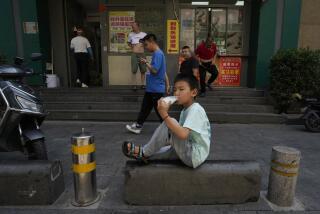China Budgets Red Ink to Meet 7% Growth Plan
- Share via
BEIJING — Struggling to fight off a recession, China’s premier outlined a spending plan today that will plunge the nation further into debt as it relentlessly pursues economic growth.
Addressing the annual session of the National People’s Congress, Zhu Rongji charted the government’s course for the next year by saying that it will incur an unprecedented $18.2-billion budget deficit, a 56% increase over last year. The funds will be spent on a series of highways, environmental protection works and other big infrastructure projects.
The plan affirmed China’s commitment to overhaul the public sector, despite setbacks in the past year because of the Asian financial meltdown and deflationary pressures at home. Experts say the growth could come at the expense of longer-term financial stability.
Zhu said the deficit budget was the only way to meet Beijing’s 7% economic growth target for this year in spite of flagging exports and consumer spending. Critics contend, however, that the 7% target is an inflated goal designed to bolster the regime’s political legitimacy at home.
Several times in his speech, Zhu stated that despite economic pressures, China will not devalue its currency, the yuan, this year.
Zhu discounted the possibility that the deficit spending would cause runaway inflation or a run on state banks. He pointed to Chinese citizens’ high rate of savings and ample supplies of agricultural products, which he said would preclude issuing excess currency.
The deficit, accounting for 2% of the country’s gross domestic product, is “below the internationally accepted alarm level,” Zhu said.
China’s fiscal spending to spur the economy will be bankrolled more by bond issues than government revenue. Last year, China issued $12 billion worth of bonds to finance infrastructure and an additional $32.5 billion to recapitalize its virtually insolvent state banks.
Analysts estimate that the percent of government expenditures financed by bonds has doubled or tripled in the past five years. Experts say this rate of increase is unsustainable over the long term, with a quarter of this year’s government expenditures already going to service the nation’s debt.
To a large extent, the deficit is a result of the state’s fiscal weakness. China’s leaky tax system rakes in revenue equal to just 12% of the country’s economic output, one of the lowest rates among major economies.
As a result, unprofitable state-owned enterprises have no unemployment benefits to offer redundant employees. The firms instead rely on policy loans from state banks to keep them from bankruptcy and their employees off the street.
This in turn, increases the banks’ percentage of nonperforming loans, estimated by officials at 25% at the end of 1997.
“That’s the real risk in a slowing economy,” Brookings Institution China specialist Nicholas Lardy noted. “The profitability of companies declines, and it feeds right through to the financial institutions that have lent them so much money.”
Of Zhu’s ambitious reforms launched last year, his three-year plan to fix China’s 300,000 state-owned enterprises has foundered the worst. Many small and medium-size state enterprises were sold last year, but corruption prompted the government to halt the privatization of smaller firms in the second half of last year.
The government’s efforts to privatize housing were sidetracked as the weakening economy put home ownership out of the reach of most workers.
Still, most observers credit Zhu and his technocrat Cabinet with modest victories. By closing provincial offices of the central bank, he thwarted political pressure from localities to dole out loans to unprofitable companies.
The parliament is also expected to make six amendments to the constitution that will abolish crimes of counter-revolution and enshrine the rule of law and the thoughts of the late leader Deng Xiaoping.
More to Read
Sign up for Essential California
The most important California stories and recommendations in your inbox every morning.
You may occasionally receive promotional content from the Los Angeles Times.













